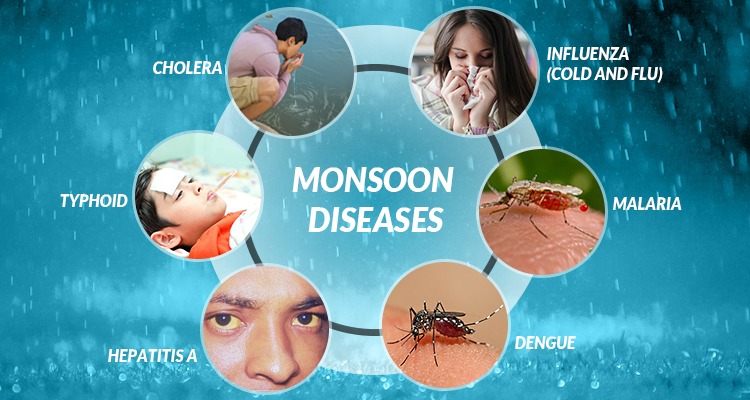
While the monsoon brings with it, its own charm and relief for the hot summer, the season also brings with it various diseases. The combination of a hot and humid climate with heavy rainfall and strong winds accelerates the spread of infectious diseases. The rainy season is also called the flu season and contributes to some of the most common diseases of the rainy season. Therefore, it is the right time to put into practice the old saying “Prevention is better than cure.” So, it is important to understand why our bodies are so and how we might effectively defend ourselves while we are most exposed throughout the season.
cold flu
Among the most common monsoon diseases, colds and flu infect millions of people every year. With the arrival of monsoons, there is a sudden change in the weather, which causes fluctuations in temperature and thereby weakens our immune system. It makes us weak and prone to coughs, colds, and flu. Maintaining good hygiene, washing hands frequently, disinfecting surfaces, exercising, building immunity, and staying warm and dry are some simple measures that everyone should take to protect themselves from the common cold and flu.
Malaria
The incidence of malaria increases during the monsoon season due to the prevalence of Anopheles mosquitoes. These infected mosquitoes transfer parasites to our bodies, causing fever, headache, fatigue, and other symptoms. Indoor residual spraying (IRS) with insecticides, using mosquito repellents, and wearing clothing with maximum body coverage are some simple ways to protect yourself.
dengue
An extensive list of monsoon diseases, dengue, is spread through the bites of Aedes aegypti mosquitoes that live in and around human habitations. The disease is spread through the bite of an infected mosquito, which then spreads the virus into the person’s bloodstream. Using mosquito repellent, clothing with maximum body coverage, mosquito nets, and avoiding exposure when mosquitoes are at their peak (like in the evening) are some ways to protect yourself.
Viral fever
Monsoon diseases in India can be serious if proper medication and precautions are not taken. Viral fever is a disease that refers to an excess of viral infection, characterized by an increase in normal body temperature. Children and elderly people are more likely to be infected due to their fragile immune systems. Personal hygiene, effective waste disposal, use of clean water, a healthy diet, and timely vaccination are some lifelong measures to protect yourself from viral fever.
Typhoid
It is a type of bacterial infection that can affect different parts of the body. Typhoid, among other waterborne diseases in the monsoons, is usually spread through contaminated water and food. Additionally, being in close proximity to someone who is infected can also be one of the reasons for catching it. Some general advice to help stay away from typhoid is to drink undiluted water, wash fruits and vegetables thoroughly and peel them if possible, choose hot and well-cooked food, get vaccinated, drink only pasteurized or boiled milk, and maintain good hygiene. All the time.
gastroenteritis
Among all the diseases that occur during the monsoon season, bacterial gastroenteritis, also known as a stomach infection, usually occurs when your intestines are affected by a bacterial infection. Inflammation in your intestines and stomach can cause severe abdominal pain and even vomiting. Washing hands frequently, not sharing utensils, towels, etc. with already infected family members, avoiding uncooked and raw food, washing all fruits and vegetables thoroughly, and drinking plenty of fluids are some simple measures that everyone should take to protect themselves from gastroenteritis.
Conclusion
While monsoons are often seen to lift the mood and enjoy those special meals, outings, and get-togethers, it is crucial to ensure that we take extra precautions. Apart from the above mentioned, our house must be properly ventilated and absolutely clean.
Five tips to keep you healthy
Here are 5 tips that will help keep your eyes healthy,
1. Eat healthily!
Like other organs, eyes also need daily nutrition through proper diet. Foods rich in omega-3 fatty acids, vitamins A and C, and zinc improve eye health.
2. Take frequent breaks from the computer screen
Computer Vision Syndrome (CVS) causes eye pain in the majority of digital gadget users.
CVS is characterized by eye pressure, dryness, and fatigue.
Tests to rule out heart disease:
When you notice one of these symptoms, you should visit a doctor and get some tests done. Early diagnosis can lower your risk of having a stroke or attack. Different tests can be used to identify cardiac disease.
1. Physical examination and blood tests:
Genetics plays an important role in heart health. Sometimes a simple chest X-ray may also be advised to obtain information on the size and shape of the heart.
2. Non-Invasive Tests:
It is the second step in heart disease diagnosis without any invasive procedure.
Echocardiogram: This is an ultrasound of your heart that is used to evaluate the heart valves and heart muscle. This helps the doctor detect any clots or tumors.
Heart MRI: In an MRI of the heart, pictures are made of your blood vessels as they beat.